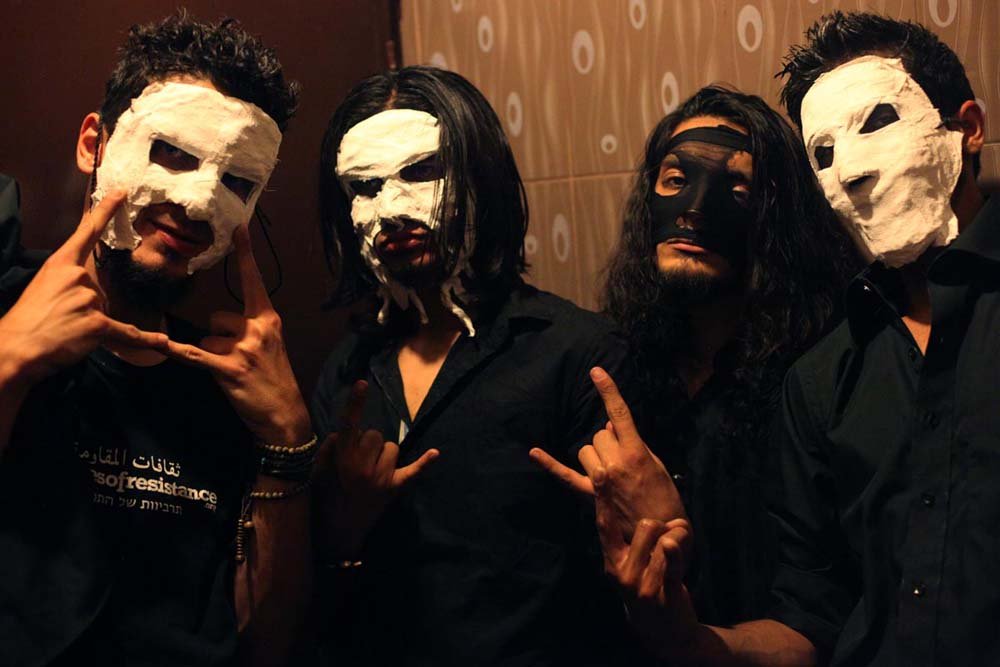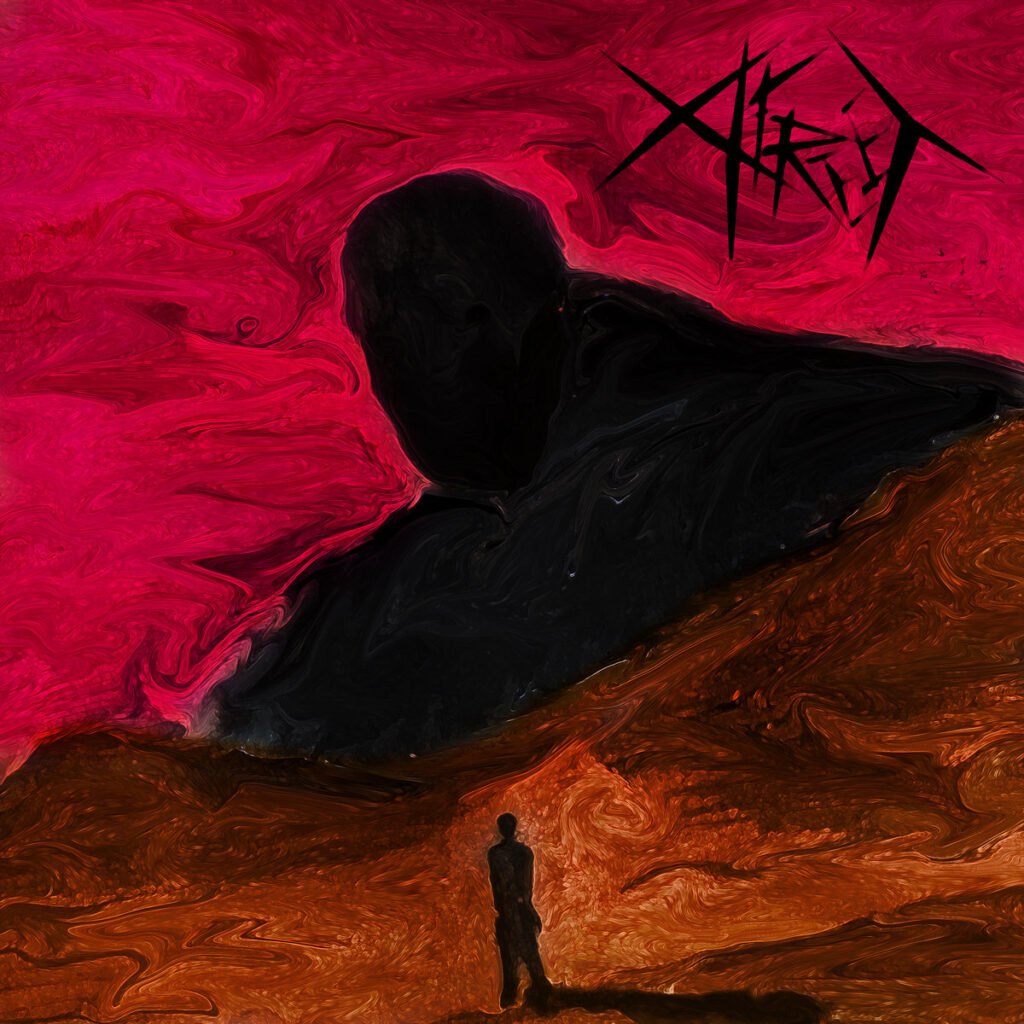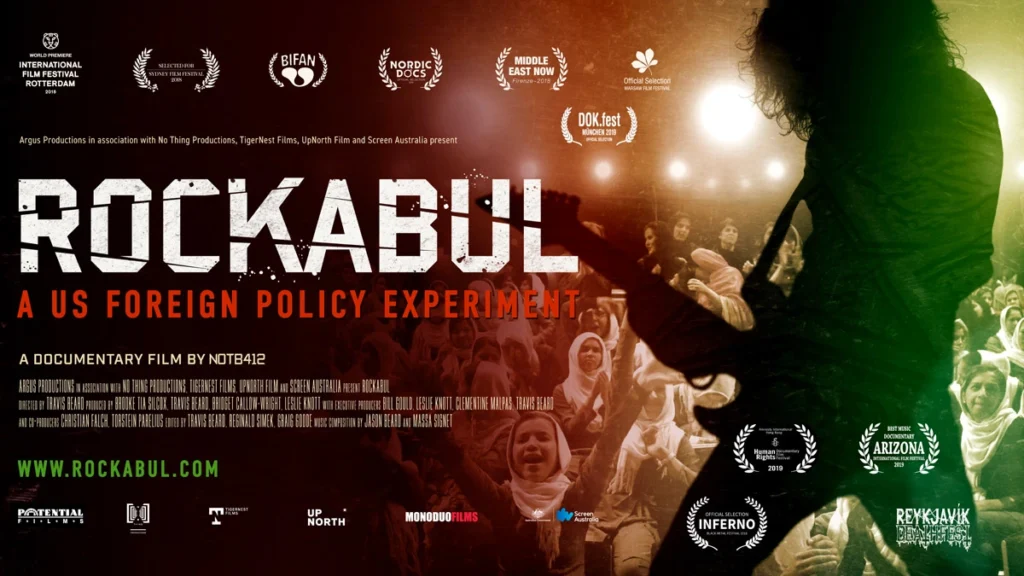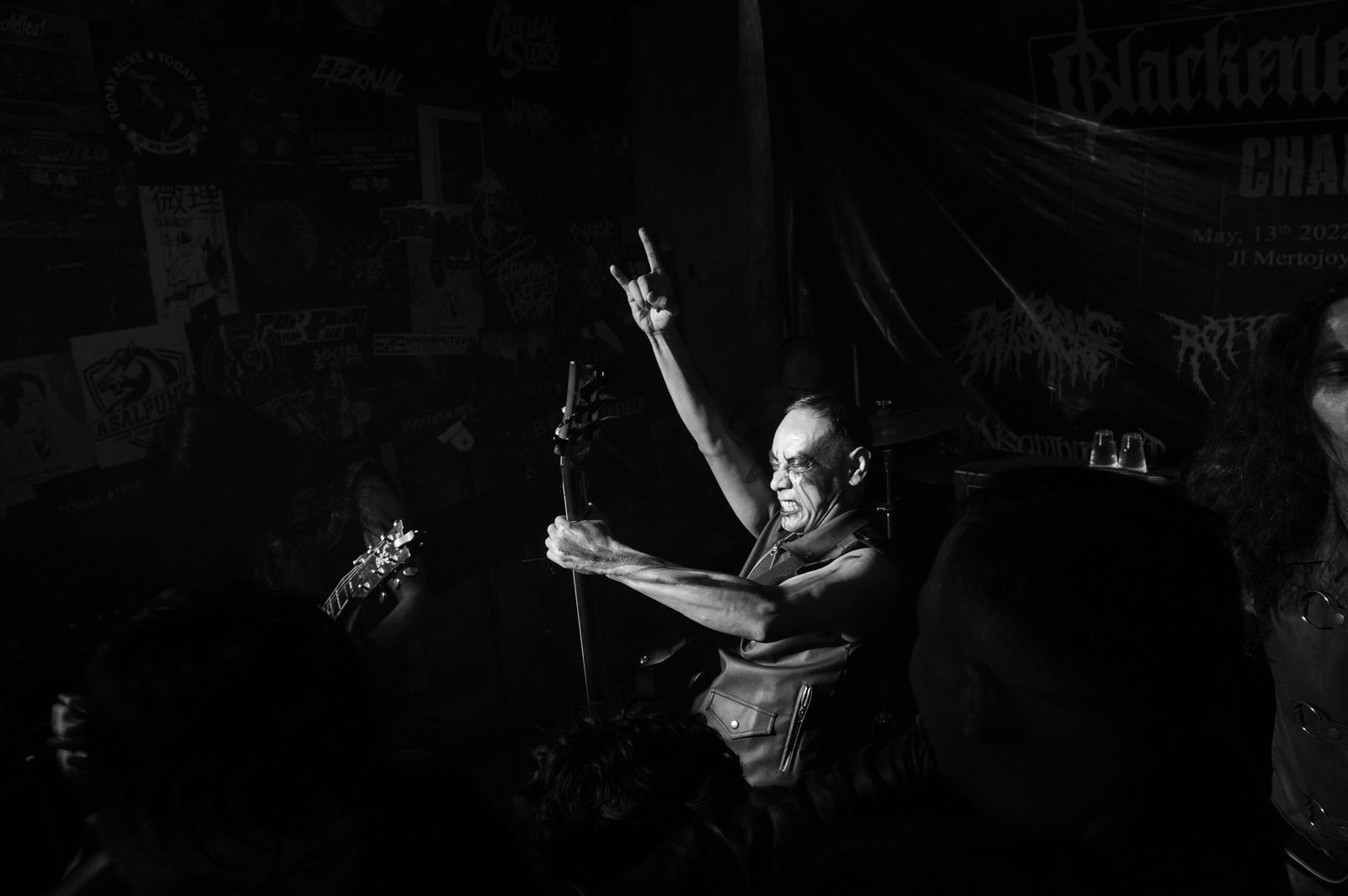
After immersing myself into the music of District Unknown and Afreet, it was only logical – to quote Spock from Star Trek – that I had to contact these guys to learn more about their music journey. What follows is the interview with Suleiman (and it goes without saying on behalf of myself and the readers of Indokult.com I am eternally grateful for his time replying to my questions).
Hello, guys and thank you very much for your time doing this interview. How are you doing these days?
Thank you for interviewing us. This is Sully, and I’ll be answering the questions for this interview today. We are doing well, staying busy and active.
It’s almost impossible to talk about Afreet without mentioning District Unknown, very probably the first metal band in Afghanistan, for you have been members of this band. But before we start to unveil that part of your personal and Afghan music history (as they are inseparably intervined), let me ask you ….how did you recall your music upbringing? I guess it was anything but metal, right? When did you first fall in love with metal music?
Yousef and I are both millennials, so we grew up with internet access. Metal and heavy music was a big part of our musical upbringing as well as rap & hip-hop, symphonic/ orchestral, and electronic music. By the time we joined a band, we had both been listening to metal bands for years, probably since before we were even teenagers.

OK, now let’s go to District Unknown…how did you end up in its line-up? I guess it’s not like a position being advertised in a music magazine…given the local hardliners’ hostile attitude towards music and entertainment, what can you tell us about the reactions of Afghan public to your music?
DU was playing a show in 2012 and needed a vocalist. The band was a bit of a revolving door with musicians coming and going, but when Yousef and I joined it gained some stability for several years. My involvement started with recording and producing for the band and I changed a guitar riff in one of their verses. Thankfully it went over well. The guys saw clearly that I’m a natural composer and songwriter and asked me to join the band, and I agreed. The reactions of the Afghan public were not positive. The reality is that DU’s music was for a very niche audience in Afghanistan that could appreciate alternative and heavy music. By and large, the music was hated by most Afghans who had nothing in common with our musical taste and upbringing.
I have read about Yousef’s problems as a musician being persecuted and even jailed… can you tell me (and our readers) more about this unpleasant part of musician’s life in Afghanistan?
Yousef personally faced the brunt of the hostility against DU’s music in Afghanistan. The place he lived in was a tightly-knit, conservative community that came after him once they got word of his activities with heavy music. It was a very difficult time for him and his family and it could have ended in many ways. Thankfully, he was able to leave, and more importantly continue doing something that has been a very important cornerstone in Afreet’s identity: to be a dedicated, musically active, and uncompromising representative of metal music from Afghanistan.
District Unknown has eventually split up, what was the reason for this split? When did you start thinking of founding a new band? And why naming the band after an evil spirit, djinn?
The story of DU’s split is a complicated, nuanced discussion. From my perspective, the short answer is that some of the founding members were unwilling to continue to play music once they got their green cards, citizenship, and comfortable life in western nations. There were also factors such as lifestyle changes and family plans that disrupted their ability to commit to the band. I think DU’s future represented a threat to their new-found lives in the west and they didn’t want to risk being haunted by the demons of the past. I’m not convinced that any of the guys that played in that band (outside of Yousef and I) were actually ever committed to being career musicians, and the reality of our lives today reflects that. I speculate that DU was possibly a vehicle for them to use for asylum cases. There are many possible explanations, as well as the more ugly details about the split that we don’t wish to discuss today. Afreet began on the same day that the old band broke up, as Yousef and I reaffirmed our lifelong commitment to representing metal from Afghanistan and metal musicians from Central Asia. For the most part, we don’t believe in explaining our lyrics or band name. We prefer to allow audiences to draw their own interpretation from the stories we tell. I will mention, however, that those who are well-researched in ancient Persian and Arabian mythology will tell you that the Djinn and Afarit were not necessarily evil spirits and were often used as a tool for both good and evil. There are old manuscripts that predate wikipedia and the internet. Truth can always be found, for those daring enough to look for it.
For time being you were still living in Afghanistan…when did you start thinking about emigrating? Now living outside Afghanistan, are you still in touch with the other members?
Yousef left Afghanistan in 2014, and I left in 2013. I am still in touch with the other members of the former band and have a good relationship with everyone.

Your debut, self-titled material appeared in 2019. It really feels like a continuation of District Unknown’s music, does it mean you were a main composer behind the music of DU as well? For people not familiar with either of these bands, what would you point out as a main difference between them (if there is any)?
I composed four songs (Modern Nature, Struggle, Whisper in a Dream, Cancer By Design) and all interludes, orchestral, and ambient keyboard sections on Anatomy. My involvement at that time was as keyboardist, backing vocalist, and producer. I took over guitars after Anatomy when Qais Shaghasy was fired from the band. I was the principal writer of the single “64” with bassist Qasem. The rest of the music was written by DU’s members before me. Afreet’s early work was definitely in the more sludge metal vein. There are huge differences between the bands, the biggest difference being that DU was a shit band with shit songs. If you peel the “Afghan band” layers back (as some people have done), and treat the songs for what they are, there is not much there in terms of musical value. None of the members had exceptional technical ability, and we were just a bunch of kids trying to make something. The reality is that any band’s first works are usually garbage, and DU didn’t make it past their first works, so the whole catalogue with the exception of maybe 64 is garbage. Afreet’s first couple works are no different in this regard, but a key difference is that Afreet is (from day one) clearly a metal band, where it’s unclear with DU. So to say that DU was Afghanistan’s first metal band is a topic of debate in itself. We believe Afreet is the first true metal band from Afghanistan while DU was simply the first heavy music in Afghanistan.

The debut was followed by “Until the End of Time” in 2020. What did you want to invoke by such an omnious statement in the title? How much continuity there is between the debut and the following release?
The two EPs were intended to tell a continuous story that in part represented our humble beginnings in Afreet. We built a world called the “Timeless Plane” where our protagonist was trapped forever, haunted by spirits who spoke in riddles. The EPs dealt with duality, mortality, and the human constructs of time and space. We have since decided to break into the real world with My Land and our upcoming album will be a different approach altogether, although we might still pop our heads back into the Timeless Plane. I guess you’ll have to wait and see.

So far your latest single is “My Land Is Breaking” and it’s not hard to see the reason behind the title. To be honest, I can’t even start to imagine how hard it has to be for a musician to live in the present-day Afghanistan, therefore sending the money from the single’s sales to help those unfortunate musicians is really a powerful statement. Is there any hope left for those Afghan artists?
Just to be clear, My Land’s funds were sent to the Sound Central charity, run by Travis Beard. Those funds are used to evacuate Afghan musicians who were under threat by the incoming Taliban regime when the song was released a couple years ago. There is always hope, my friend. We are so often in a rush to win battles today and tomorrow and forget that the bigger wars might be won and lost many generations after we die.
Information available tells me about Afreet working on their debut album…how far are you at the moment? When we can expect new material from you?
We are at the halfway point right now. I won’t put an exact date on it yet but we can say with confidence that the album will be completed next year (2024). Yousef came to Denver earlier this year for our first recording session for the album. I’m flying to the United Kingdom to meet with Yousef at the end of this month for our second session, and we’re actively working on the record between trips. The album is mostly written already, so we’re primarily working on recording and technical stuff at the moment. This album will be our first completely DIY work (self-produced, recorded, mixed, and mastered) so we’re very excited to share the next evolution in Afghan metal.
I think it’s time to switch our focus just a bit and return – although briefly – to District Unknown. That former band of yours has been featured in a documentary RocKabul, released by the Australian artist Travis Beard. Can you share some interesting experiences working with this interesting man? Are you still in touch?
We are still in touch with Travis. There are many stories of our experiences with Travis in Afghanistan. His legendary Yamaha acoustic guitar was used to record parts on Anatomy. Personally, I can say I might not be playing in a metal band today if it wasn’t for Travis facilitating the creative spaces and live shows in Afghanistan. He’s been active as a filmmaker and musician from the day we met him and has just put out another documentary that discusses the events that unfolded in Afghanistan when the national government was toppled.

I have to say, I’d love to watch you play live, but as a duo, it’s probably not possible. However, do you think about a future live performance with help of session/live musicians?
Actually we’re living in 2023, so it’s absolutely possible to play an incredible show as a duo. Some artists play by themselves. I don’t see any problem with it. That being said, Yousef and I are already organising a European tour in 2025 and are in touch with some musicians who are interested in touring the new album with us. We may be a 3-piece, maybe 4. Although we won’t yet dismiss it, we aren’t in love with the idea of hiring session musicians. We’d rather hunt down permanent members who can add value to the band and understand/ share our vision for the future: that Afghan metal will come to the forefront of metal music in Asia and beyond in terms of being a high-quality and highly creative art form.
Your songs are available on Spotify (among other sources). How about the physical release? Anything available?
There’s no point in physically releasing anything in this day and age. However, Yousef and I are record enthusiasts and will be pressing a limited vinyl run for the album next year. Aside from that, our complete musical works are for sale on Bandcamp.
And speaking of physicals…any other merchandise fans of Afreet and supporters of Afghan music can buy?
Not yet. We want to focus on the music first and everything that surrounds the music will come afterwards.
Coming slowly, but steadily, to the end of 2023…what plans do you have for the last 2 months…and what’s ahead for Afreet in 2024?
As stated before, I’ll be visiting the UK for Afreet’s second session in November, and we are looking to push the album along. Yousef will probably visit Denver one more time early next year and we’ll look to begin finalising the album in the early summer as well as opening auditions and finalising our tour plans.
And nearing the end of this interview…any final message to our readers?
First off, thank you for interviewing Afreet. We appreciate your time. We have a very important message to deliver to your readers and anyone who is following the District Unknown/ Afreet story arc:
District Unknown was a rock band that ended 7 years ago. It’s a dead band. Afreet is the only true metal band from Afghanistan. It’s time to move on from this topic of discussion, as it does not represent the future of Afghan metal music. It’s time to move on from a dead project that was mostly inhabited by non-committed musicians and wannabes. To our knowledge, there are only two true career metal musicians of Afghan origin in this world: Yousef Shah and Sully Omar. If there are others out there, we want to meet you. We hope to grow this list to include many more dedicated musicians and fans, and we will do it through inspiring people with our new music and messages.
Thanks again for the interview!
-Sully from Afreet
Bandcamp: https://afreetmusic.bandcamp.com/
Spotify: https://open.spotify.com/artist/3S1dVeIaCC25XAx4ZUZcxj?si=8yI6RX5KTl2RcUZTR3RfbA
Facebook: https://www.facebook.com/afreetofficial
Instagram: https://www.instagram.com/__afreet/




